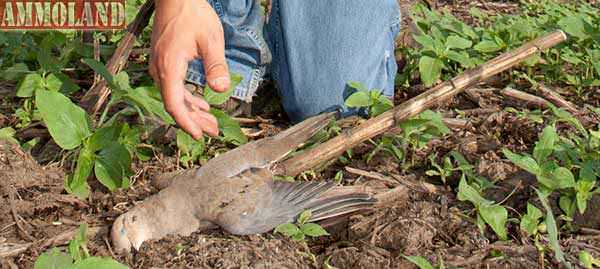

PRATT –-(Ammoland.com)- The opening day of dove season, Sept. 1, is one of the most anticipated opening days of the year because it’s been a long layoff since last year’s hunting seasons closed. Dove season signals the beginning of fall, and it gets hunters back in the field.
The Kansas hunting season for mourning, white-winged, Eurasian collared and ringed turtle doves is Sept. 1-Nov. 29, 2016. This is a change from previous years when there was a split in the regular dove season. The exotic dove season, Eurasian collared and ringed turtle, opens Nov. 30, 2016 and ends Feb. 28, 2017. The daily bag limit during the regular season is 15 mourning and white-winged doves, single species or in combination. There is no daily bag limit on Eurasian collared and ringed turtle doves, but any taken in addition to the daily limit of mourning and white-winged doves during the regular season must have a fully-feathered wing attached during transport. Doves may only be taken while in flight.
Resident hunters age 16 to 74 must have a Kanas hunting license, unless exempt by law, and a HIP permit to hunt doves. Anyone born on or after July 1, 1957 must have completed a certified hunter education course except those 15 and younger hunting under adult supervision or those hunting on their own land.
Kansas typically ranks very high among states for breeding dove populations through the summer, so by September, the Sunflower State is literally teeming with doves. And speaking of sunflowers, doves love to eat sunflower seeds, so sunflower fields are great places to hunt them. In fact, some wildlife area managers plant fields to sunflowers or other grain crops and manage them specifically to attract doves. You can find which areas have these fields at www.ksoutdoors.com by typing “managed dove fields” in the search box. Hunting can be outstanding on these specially managed fields. The 2016 Kansas Hunting Atlas with maps showing all public hunting areas and Walk-in Hunting Access can also be downloaded from ksoutdoors.com by clicking “Hunting,” then “Where To Hunt.”
Pasture ponds can also be great places to hunt doves because the speedy little gray birds will typically fly to water in the evening. They prefer ponds with open, bare dirt shorelines. Pick the right pond, and you might shoot your barrel hot just before sunset.
There isn’t a down side to dove season. The weather is mild, doves are a plentiful and challenging quarry, and grilled bacon-wrapped dove breasts are delectable.
